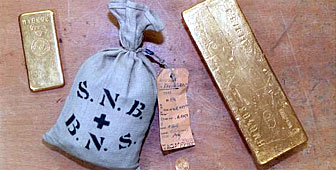Parliament agrees to fund charity from gold reserve sales

Parliament has endorsed a government project to set up a new charity for the needy. The Solidarity Foundation would be funded through the sale of excess gold reserves from the National Bank. But further debates are planned in parliament before Swiss voters get the final say at the ballot box.
The House of Representatives on Tuesday followed the Senate and approved the proposal to spend a third of the interest on the sale of 1,300 tonnes of excess gold reserves of the National Bank on the Solidarity Foundation.
A further one-third of the funds would go towards the state pension scheme and the last third, to the country’s 26 cantons to be spent at their own discretion.
However, further discussions are necessary in parliament mainly to iron out differences over the long-term use of the excess gold reserves. The Swiss electorate will have the final word on the issue.
Fight hardship at home and abroad
The Solidarity Foundation would grant financial support for prevention projects to combat poverty, illness and hardship, mainly among the young generation.
Under the proposal, the funds are to be spent on programmes in Switzerland and abroad. The mandate of the Solidarity Foundation is limited to 30 years.
The project for the Foundation was launched by the government in 1997 and coincided with the debate on Switzerland’s role during the Second World War.
National assets
The two-day debate in House of Representatives was marked by discussions on several counter proposals, particularly a plan by the right-wing Swiss People’s Party to spend the full amount of the money on securing the state pension scheme.
Opponents said the assets of the National Bank belonged to the Swiss people alone and that they should be used to shore up the much-vaunted social security programme. They also said the Solidarity Foundation was the result of blackmail by groups critical of Switzerland’s role during the Holocaust era.
Three of the four main parties, however, came out in favour to the foundation, saying the charity was in line with Switzerland’s humanitarian tradition. A clear majority of speakers also supported the three-part funding scheme and followed the Senate, which overwhelmingly endorsed the foundation in June.
Concluding the debate in the House, the finance minister, Kaspar Villiger, defended the project and dismissed allegations by opponents as absurd and selfish. He said the foundation was an investment in the future and described solidarity as a tenet of Swiss identity.
The National Bank is planning to sell a total 1,300 tonnes of excess gold reserves by the second half of 2004, in line with an agreement with 15 central banks in Europe. Since May 2000, the Swiss National Bank has put about 320 tonnes of gold on the market.
by Urs Geiser

In compliance with the JTI standards
More: SWI swissinfo.ch certified by the Journalism Trust Initiative

You can find an overview of ongoing debates with our journalists here . Please join us!
If you want to start a conversation about a topic raised in this article or want to report factual errors, email us at english@swissinfo.ch.